|
New Nematobrycon palmeri in quarantine...
Hello WWM Crew!
<Hello Rene!>
I am coming to you with a question and hopefully a possible diagnosis for what
is going on with these guys. I recently received 6 Nematobrycon from a fish farm
that is usually reputable so I will keep their name to myself for now.
<Understood. Emperor Tetras are usually good value. They're adaptable and not
prone to disease.>
I Ordered these guys a few weeks ago but they were just sent this week. I got
them unpacked and into the quarantine tank when I noticed that 4 of the six had
strange looking (bumps/growth?) on their chin area sizes of the growths vary
from fish to fish. Not sure if it is some kind of birth defect, tumor or
parasite possibly?
<The fact all of them have the odd mouth defect is striking. I have seen the
occasional tetra with this sort of thing, usually in Neons, and put it down to a
birth defect or possibly the result of fighting. Whether such a defect is
genetic or caused by, for example, lack of some key nutrient during growth is
hard to say.>
It doesn't look like fungus to me, not cotton like or hairy. More like a
growth/tumor of some kind.
<Agreed.>
I did message the farm about it within minutes of getting them sorted in the
tank for inspection. That was yesterday morning and I have not heard back from
them as of yet (possibly due to the weekend) so I have been looking online for
any kind of answers. I have come up with nothing. I can send my tank info if
needed I just didn't think it was relevant considering this particular
situation. I am including the best pics I could manage to get as they are quick
little things. Some of them are eating but not all of them.
<If they're feeding, then a non-lethal birth defect may be the case here.
But I would still expect a full refund, even if sending the fish back is
pointless. No reason to destroy them humanely if they can feed, but neither
should you accept them as good or even acceptable quality Emperor Tetras that
satisfy your contract with the seller.>
I do not want to just start dumping meds into the water unless needed.
<Agreed; and without symptoms, any medication would be random.>
I do have Kanaplex, API General Cure, Jungle Fungus Clear and Levamisole HCI on
hand if any of those would be helpful. Any thoughts would be greatly
appreciated! Thank you in advance. Rene'
<Most welcome. Cheers, Neale.>
Filter is only a couple weeks old.
<I don't understand this exactly. Do you mean you changed the old filter for a
new one? If so, then the new filter could be cycling and ammonia and nitrite
above zero. That could easily account for the problem. If you mean the tank had
no filter at all until two weeks ago, I'm surprised this puffer survived until
now.>
I know not to change everything all at once. Is he dying? I think I'll die if he
does.
<My first step would be to check the salinity. Strongly brackish water will
help. If you're dosing salt in "teaspoon per gallon" amounts then you're not
doing it right. You really need substantial amounts of marine salt mix. For SG
1.005, at 25 C you'd be dosing the salt at 9 grams per litre (1.2 oz per US
gallon) which is quite a bit -- 9 grams is about 1.5 teaspoons of typical salt
mix. I'm also going to ask you to check the ammonia and/or nitrite levels. If
they're not zero, then that's a major problem that needs urgent attention. I'm
finally going to have you do some reading, here:
http://www.wetwebmedia.com/brackishsubwebindex/gspsart.htm
Hope this helps, Neale.>
|
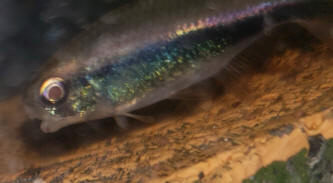 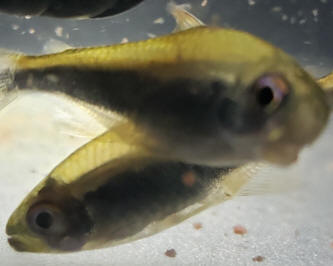 |
|
Re: New Nematobrycon palmeri in quarantine...
4/1/19
Hello Neale!
<Good afternoon!>
Thank you for responding so promptly!
<Welcome.>
I honestly hadn't even thought about asking for a refund as they arrived
alive. I will definitely look into that as its always a bit more costly
ordering fish directly.
<Indeed it is, hence the usual contract in terms of safe arrival of
livestock.>
Unfortunately we have no quality pet stores in my area, just a Petco and
you couldn't pay me to take home anything they have. That said, a birth
defect or possible injury from fighting is actually a relief to hear
considering the other possibilities.
<Understood.>
I wanted to find out as much as possible as soon as possible as some
things are so time sensitive when it comes to most fish illnesses.
<Correct.>
Aside from this they appear to be healthy.
<Good; and if feeding and behaving normally, this is a good reason to
assume a birth defect.>
Thank you again for your time and response. We really do rely so much on
this site and all of you when it comes to our aquatic hobby. Sorry about
the lengthy messages. Thank you again!
<And thank you for these kind words. Cheers, Neale.>
|
Now: AZGardens, not sending the right fish/replying to messages (Was:
New Nematobrycon Palmeri in quarantine...) 4/3/19
Re: New Nematobrycon Palmeri in quarantine...
Sorry to add on, but something else I notice is bothering me... I don't think I
was even sent the correct species.
<Does indeed seem the case with these photos.>
Once they settled in and I was able to get a better look at them. I would like a
second opinion. I am attaching a couple of new pics with them colored up, as
well as a stock photo of what I believe them to be.
<Indeed.>
The first thing I noticed was that they have adipose fins. If I remember
correctly Nematobrycon Palmeri (Emperor Tetra) don't have those fins at all? Or
am I mixed up in my memory?
<You are quite correct.>
So I was thinking maybe they were Inpaichthys kerri (Royal Tetra) except that
the markings and coloring do not match up, in the end I believe they are
actually Hyphessobrycon margitae (Red-Blue Peru-Tetra) ...
<Certainly seems plausible.>
I am sorry to bother you all with this but the farm still has not responded to
any of my emails and I am in the process of going through my PayPal to request a
refund as the farm (AZGardens) will not even attempt to work with me.
<PayPal often do help here.>
If you agree that these fish are not the correct species that I ordered and paid
for please let me know!
<Your photographs are definitely NOT Nematobrycon palmeri; they do not seem to
be Inpaichthys kerri either. Definitely something else. Whether precisely
Hyphessobrycon margitae isn't something I'm quite so sure about.
But Hyphessobrycon something, yes!>
I am finding through more research that this "farm" isnt as reputable as I had
thought after more investigating when they didn't respond to my emails at all or
even acknowledge them. Sorry to take up your time. Thank you,
Rene
<I don't know anything personally about AZGardens, so can't comment on their
reputation. But in this instance, yes, you seem to have been sent the wrong
species, and pretty poor quality specimens at that. Cheers, Neale.>
|
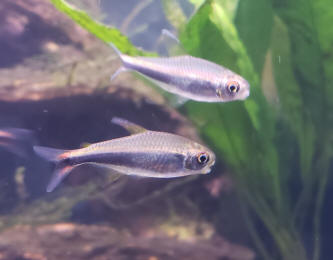
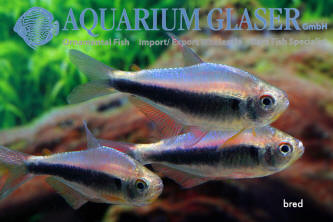 |
|
Breeding emperor tetras 2/17/14
Hello:
I have five emperor tetras in a 75 gallon at the moment. The are in
there with Congo tetras and two angelfish. The really slow moving
angelfish ignore them. We have hard water. There is no water
softener in the house so the gH is high, I tested the kH and it is fine
for swords and guppies, but not for Emperor tetra breeding. They are
speedy little things. Anyway someone at the LFS said that I could put
them in the 10 gallon with half distilled water and half tap, filled
only to the five gallon level, at about 78 degrees and let them go at it
and if they breed the usual tiny live foods. I wonder if this is
possible? Some of the stores here would love to get emperors as they are
hard to obtain. Is distilled water mixed with tap as good as R/O Thank
you
<Distilled water and RO water are interchangeable for aquaristic
purposes; indeed, rainwater has historically been used as a substitute
for both, though there are attendant risks to using rainwater to do with
ambient air pollution and the cleanliness (or otherwise!) of roofs,
gutters and rainwater storage butts. And yes, it's absolutely standard
practise to mix tap water with de-mineralised water to make up what you
want; for example, I routinely use a 50/50 mix of rainwater and tap
water for my water changes, but the exact proportion will depend upon
the desired hardness (pH is somewhat less of an issue provided its
stable, as it seems to be calcium ions in particular that affects the
viability of fish eggs). So if you have 20 degree dH hardness water and
want water of 5 degrees dH, then you'd use 25% tap water and 75%
de-mineralised water of some sort. Assuming you don't have clean
rainwater, then the easiest way to get (relatively) inexpensive
de-mineralised water is from your local aquarium shop, where it'll be
sold by the gallon for use in marine aquaria. Do bear in mind you'll
need to scale your demands for such water with regard to both the
aquarium size and the frequency of water changes, so budget accordingly.
In any case, I've not bred Emperor Tetras so can't comment in detail,
but it is generally regarded as one of the easier tetras to breed, so
definitely worth a shot.
Instead of me rewriting someone else's notes, have a look at what Gary
Lange has to say over at FishChannel:
http://www.fishchannel.com/freshwater-aquariums/species-info/tetra/breeding-emperor-tetras.aspx
The SeriouslyFish page is pretty good too, with some specific water
chemistry values to aim for:
http://www.seriouslyfish.com/species/nematobrycon-palmeri/
Hope this helps, Neale.>
Breeding emperor tetras 2/23/14
Hello:
I am acclimatizing three emperor tetras to the 10 gallon. A mixture of
75% distilled water and then rest from the 75 gallon. I am putting three
in now. One aggressive male and two females. There are two males left in
the 75 gallon. What is the best ratio of males to females in a ten
gallon. I am thinking of getting another male tomorrow, but maybe it is
ok the way it is. Thank you
<No personal experience of this species but Baensch suggests using
pairs.
Do condition them properly beforehand though (live or frozen food likely
essential) and make sure the breeding tank is somewhere dark. Cheers,
Neale.>
Re: Breeding emperor tetras 2/24/14
Hello:
The breeding tank is dark 75 F and I may get a male emperor tomorrow to
even it out. These tetras can be $7 each unlike the $1 sales on neons.
It's strange they are so pricy here.
<Not really. That's a $1 charge for Neons that are crummy fish thanks to
years of poor breeding, pretty much guaranteed to come down with Neon
Tetra Disease within a few months (if not weeks) of purchase. Neons
furthermore need soft, acidic water to thrive (their lifespan in hard
water is limited, at best) and should also be kept relatively cool,
around 22 C/72 F, which hardly anyone bothers with, least of all the
retailers, hence them being half-stressed when purchased anyway, let
alone any predispositions they have to disease. Compare that to a $7
charge for Emperor Tetras: a bigger, more interesting fish that has an
excellent track record in terms of hardiness and adaptability to hard,
alkaline water conditions and does well at normal tropical temperatures.
Realistically can expect these fish to live 3-5 years if properly kept
for, possibly longer. Hmm... Emperor tetras starting to sound like a
bargain, perhaps! The question isn't really why Emperors are expensive
(they're really not, big scheme of things) but how Neons are kept so
low, and like suspiciously cheap food, there's a reason for their low
cost. Mass production, ubiquitous use of antibiotics, no attempt made to
separate healthy specimens from sickly ones anywhere along the
distribution chain. Interesting fact: the first Neons brought to Europe
flew across the Atlantic on the old German airships of the 20s and 30s,
and they were priced accordingly.>
Anyway my spouse my spouse and I took a hike in a preserve today and I
got a couple of jugs of water in the stream that I will not be using. It
warmed up in upstate ny for the past couple of days and the streams are
running with snow melt. The water is a tannin brown color everywhere. I
even put a gallon glass jar on the deck and caught snow melt from the
laminate roof, same color as the stream. I did not use any of this water
in the tank because free low KH water is too good to be true around
here. I boiled a gallon, and it is still brown tinted. The boiling
probably got rid of any pathogens, but contaminants are an issue, maybe
pesticides from farm water run off. I wish there were a way to truly
test water as in test for everything imaginable, but the tap water
testers omit the important stuff for aquariums. It would be nice if US
houses had slate roofs like they do in England
<Indeed. Well, good luck with what you're doing. Snowmelt from a
national park or similar should be fine, even if a little "brown".
Cheers, Neale.>
Temperature fluctuations in tank
and Nematobrycon palmeri, Neale 1/31/12
Hi crew,
<Duncan>
Hope you're all well and thanks again for an awesome website.
<Thanks and you're welcome>
Two inter-related issues that I've got if that's O.K. - I
haven't found exact answers after extensive searching on WWM and
other web sources.
1) I've just set-up a new tank that is currently fishlessly
cycling. I
don't heat it as I already have one here in my Singapore unit (2ft,
15G) whose water sits between 27-28 deg C (room temp), and currently
houses 12x cardinal tetras and 1x banded gourami juvenile. The catch is
the new tank is in a child's bedroom which is cooled at night so he
can sleep properly.
In 24 hours, I've seen min-max temps of 24-27 deg C. Is this too
much variation and therefore should I put in a heater to bring the
minimum temperature up?
<It is likely too much variation. I would employ a thermostatic
heater. Keep near 27 C.>
2) Nematobrycon palmeri. Having researched them on WWM and elsewhere,
I'd love some for this new tank (darkish substrate,
well-planted, tap water KH = 3 and pH = 7.2). It's a bit of a
weird one - dimensions are 50.5cm X 45.5cm X 30cm (approx 68L / 18G) -
a relatively shallow almost-square. Is the tank too small for a small
group (say 3-4 males and 5-6 females), especially given the longest
dimension is only 50cm?
<I'd limit this volume to just two males, four or five
females>
Thanks crew, you're the best.
Duncan.
P.S. A while back (say, August-September last year), Neale helped
inform my idea of a 4ft planted tank with no lighting fixtures. I
promised an update - I've taken some progress photos and will
include them with a semi-detailed account of the relative success
I've observed in the near future!
<I will place this note in Neale's in-box here. Cheers, Bob
Fenner>
Erratic behaviour in male
Emperor Tetra 12/8/11
Hey,
I have recently set up my first ever tropical fish tank and after a
long
period of patient preparation and water testing I have bought myself
3 (Two female one male) Emperor Tetra and 3 Boesemanni
rainbows
<Mmm, not a great mix of species... "Like" different water
qualities (See WWM re or elsewhere), and the Rainbows are really too
active/rambunctious for the Emperors>
All seems to be going fine and none of the fish seem to have any
problems as individuals, but I have noticed that the male Tetra tends
to swim rather erratically and seems slightly aggressive to the two
females, I have tested the water for nitrate and ammonia and they are
both at zero.
<Good>
The PH is at 7 and temperature is kept between 23 and 24. I am feeding
them a small amount only once a day as they are the first fish in the
tank. Is this behaviour normal and if not how can I help the
situation?
<More "cover" (plants and decor) will definitely help...
as will time going by... and large-enough quarters... you don't
mention the size of this system... I do hope it's at least twenty
gallons, two foot long...>
Thanks for your time and expertise.
James
<Welcome. Bob Fenner>
|
ID help please-- 02/28/09 Hello WWM Crew, The
other day, I found these "Emperor Tetras" at a LFS. I
have found only two pictures of them online, under the name Black
Emperor Tetra. Can you tell me anything about these guys? I
suspect they are Nematobrycon amphiloxus, but I cannot find
definitive info about this. Can you confirm this? Do these guys
get large like the typical emperors or stay small like kerris?
Are these rare or new in the hobby? Any help appreciated, I have
five in a planted tank and have attached pictures (sorry, kinda
blurry). Thanks, J.P. <Greetings. Your fish is indeed the
species traded as Nematobrycon amphiloxus, or the Black Emperor
Tetra. However, Nematobrycon amphiloxus is considered to be a
junior synonym of Nematobrycon palmeri by ichthyologists, meaning
the two fish are one and the same thing. So any information that
applies to the one applies to the other. At best, Nematobrycon
amphiloxus is a colour morph of Nematobrycon palmeri. In any
case, Emperor Tetras are fairly easy fish to maintain. They
aren't that fussy about water chemistry, though very hard,
very basic water should be avoided. Anything around pH 6-7.5,
5-20 degrees dH suits them well. They do need soft, acidic water
for breeding though. Emperor Tetras are odd beasts in that they
don't really form schools though they should be kept in
groups. Males hold short-term territories around plants and shoo
off other males. Females are gregarious. I always think
they're a bit like teenagers at a disco, with the girls in a
group, and the males each trying to attract one of to his corner
of the room! Do try and keep more females than males so you can
observe their behaviour whilst avoiding bullying. Anyway,
they're good fish for planted communities, but because
they're quite large (up to 6 cm) and infamously greedy fish,
you do need to watch water quality. They're omnivores and
appreciate some green foods (e.g., cooked spinach and squished
tinned peas) in their diet. Generally nice fish; enjoy!
Neale.>
|
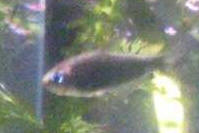 |
|
Re: ID help please 3/1/09 Neale,
Well I have 2 females and 3 males. I initially bought three and
went back for the whole school, but only two remained. Mine seem
to school at times, which is odd because I have kept Emperors for
years and they never acted in that manner. They are really nice
looking little fish. Thanks for the info! -Jayson <Likely
schooling at the moment because they're juveniles or outside
of the breeding season. Once settled and grown up, the males will
become more territorial, so watch for any signs of nippiness
between them. Great fish, and I'm sure you'll enjoy them.
Be sure and feed a mixed diet for optimum colouration! Not just
flake! Cheers, Neale.>
|
| Can you identify this for me 10/14/07 I am
curious to know what kind of fish this is. I found it on the web,
but so far haven't found out what it is... Thanks so much!
Tamara <Tamara, would be happy too... but you sent no photo or
link to photo on the web. Try again, and we'll give it the old
college try! Cheers, Neale.> Re: can you identify this for me my
apologies, I guess I didn't click the attach button...here it
is again. Thanks!! Tamara <Greetings. That's an Emperor
Tetra, Nematobrycon palmeri. And yes, they do look like that... but
only when mature, and only in well-maintained tanks with a dark
substrate and lots of plants. Ideally, with blackwater extract
added or peat granulate in the filter. Too often they are kept in
generic aquaria with plain gravel and not enough plants, and in
response their colours become much more subdued (this is actually
very, very common with freshwater fish, and one reason people
*think* freshwater fish are less colourful than marines). So, you
need a tank with lots of plants to produce shade, black sand
(non-calcareous of course), good water quality, and water chemistry
around 6.0-7.5, low to moderate hardness. As with any other fish,
they get the best colours when well cared for, and that includes a
nice varied diet including both meaty (bloodworms, daphnia, etc.)
and green (algae-based flake) foods. The males are quite feisty, so
keep a good size group with more females than males if you can. Six
would be a good start, but ten would be better. (People often just
buy males of these and other fish, but paradoxically this does
nothing to enhance the look of the tank: You need enough males that
they all "colour up" while displaying to one another, but
also enough females that the males get "in the mood" in
the first place, and also enough females that aggression between
males is diluted throughout the school.) Colour also depends on
what lighting you use: blue lights (like Tritons) will accentuate
the blue colours on the fish, while purple lights (like Gro Lux)
bring out the red/purple shades. So a mix of lamps in the hood
would be ideal. Lovely, lovely fish, though often underrated when
seen in bare, brightly-lit tanks at the shops. There's a
look-alike species called Inpaichthys kerri, sometimes sold as the
Emperor, but among aquarists better known as the Blue Tetra. As its
name suggests, it is more blue than purple, but otherwise the two
species are very much alike in requirements and habits. Both are
excellent community fish. Cheers, Neale> |
|
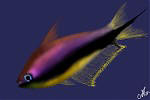
|
|
|

